For new readers: HERE are links to my ebooks and best recent posts.
How to read this: Gallop through this long but critical post by reading my introductory writeup, then quickly scan Dr. Kilz’s essay with the study summaries. Comprehensive similar reference are HERE and HERE.
To learn the truth, you have to ignore the mainstream noise that insists that up is down and black is white. The following is an example of their lies brought to you by the American Heart Association (AHA), a group with a $1.19 billion yearly budget. They claim that 84 percent of it is from “non-corporate sources” but refuse to disclose whom they are. If you think grateful patients and small donors gave it to them, you are likely already in line for the next Pfizer vax.
Here is the kind of thing that they say: “Polyunsaturated fats can help reduce bad cholesterol levels in your blood, which can lower your risk of heart disease and stroke.” If you buy that, you may already be having chest pain.
Why I put together a second seed oil post
Even though I had already written about this HERE, my friend RR challenged the “seed oils are poison” story:
What "anecdote" proves seed oils are inflammatory? "I don't use seed oils and have a low CRP score"? I don't eat seed oil and have never had a car crash. Does that prove seed oils cause car crashes?
And maybe there are some well-controlled studies showing seed oils cause xxx...but I have yet to see them.
A thousand people saying seed oils are dangerous is useless without evidence. A thousand people say aliens have kidnapped them....but not one thought to take a photo, of course.
RR apparently DFR my other essay. This one, which centers around Dr. Kiltz’s essay, is more comprehensive and better referenced.
The photo above was taken in a Trinidad supermarket aisle filled with these cheap, urine-colored poisons. Trini has more fresh food than anywhere else, but instead of featuring it, grocery stores serve up bottles and packages of cancer, heart disease, obesity, and other inflammatory conditions. It is just like home.
I got worried when I flunked my omega test.
Omegas are polyunsaturated fatty acids (PUFAs), most of which are regarded as health hazards. The omega 3s found in fish are the exception. Omega-6s are inflammatory, and they create susceptibility to cancer, heart problems, and other diseases. Your ratio of 6s to 3s is a measure of your recent consumption habits and disease risks. Although I am average for Americans, I am in the danger zone:
To check whether you pass or fail, spend $50 at omegaquant.com for a test kit. You must be brave enough to stick your finger for a drop of blood.
This ratio of omega 3 to 6 should ideally be 1:1 or 1:3 tops, but for Americans, it averages 20:1 or about 5 percent like mine. Few besides heavy fish eaters have healthy ratios. Since I hate fish and am concerned about mercury, that is not me.
Every cell in our bodies contains fatty acids, and their saturation (see below), predicts good or poor health. The above was measured from my red blood cells, which reveal only three months of information because they turn over during this time. Several years of a good diet are necessary to improve the fatty acid composition of the entire body.
When I flunk a test, I cry a little, then go back and study
To learn why I got that F, I reviewed the following. I had fooled myself into thinking that I was eating well, but my diet was terrible.
Saturated fats have all their carbons occupied by hydrogen molecules, so they are not as susceptible to oxidation and its inflammatory effects. Animal fat has this structure, and consuming it is good for you. Tip: dairy fats from milk and cheese are even more protective against cardiovascular disease than the fats from beef.
The more saturated a fat is—the more hydrogen atoms it has—the less susceptable it is to this oxidation problem. Monounsaturated fats like olive oil are good for you but not as good as fully saturated animal fats. And since the majority of olive oil is being cut with the damaging seed oils, cooking with ghee or butter is safer unless you are sure of your source.
Omega 3 polyunsaturated fatty acids (PUFAs) are present in foods such as fish, krill, and flaxseed. These include alpha-linolenic acid (ALA), eicosapentaenoic acid (EPA), and docosahexaenoic acid (DHA). Their structure allows for some oxidation. These are healthy but not as beneficial as (saturated) animal fats, which have little tendency to oxidize.
Omega 6 polyunsaturated fatty acids are highly inflammatory and damaging in the huge doses we eat. Their structure allows for lots of oxidation. They include linoleic and arachidonic acids, which are large percentages of seed and artificial oils. These promote cancer, obesity, and diabetes. The traditional thinking is that consuming them is required because the body cannot make them. (Mercola has read the primary literature and disputes this.) In any case, getting too little of these is impossible if you eat any modern food.
[Omega six fatty acids] are part of your defense system against foreign invaders. They are in seed oils, canola oil, and soybean oil and are the precursors to arachidonic acid, which is the precursor to virtually all of the pro-inflammatory cytokines (from Dr. Robert Lustig’s lecture, the main reference for this section).
Avoiding processed foods is the best way to decrease your consumption of omega 6s.
Trans fats
These have been restricted in US consumer products since 2015 because of their well-known health hazards. They should be banned, but they are still ubiquitous in:
Commercial baked goods, such as cakes, cookies and pies.
Shortening.
Microwave popcorn.
Frozen pizza.
Refrigerated dough, such as biscuits and rolls.
Nondairy coffee creamer.
Stick margarine.
Foods that are deep-fried in seed oils by fast food outfits such as french fries, doughnuts and fried chicken are full of trans fats.
Seed oils turn into trans fats when the temperature in the frying pan rises to their “smoke points.” Olive oil, for example, starts to burn as low as 310 degrees F. Its best use is for sautéing, drizzling over finished dishes, and making salad dressings. Avocado oil’s smoke point is 520 degrees F, which makes it resistant to this conversion. It is 70 percent monounsaturated and has a mild, buttery flavor. Finally, coconut oil has many virtues, but it burns at only 350°F, which is ideal for sautéing and baking but not frying.
Corn oil’s smoke point is 400 to 450°, which works for high-heat frying if you do not mind getting fat or dying of cancer or heart disease.
Saturated animal fats such as butter (smoke point of 350 degrees F) are not susceptible to this devilish transformation. Clarified butter (ghee) does not burn until 450 degrees F, making it the best option for searing, frying, or making sauces.
NB: Westin Price Foundation writer Mary Enig, PhD, disputes this theory HERE, claiming “trans fats are not formed by heating vegetable oils.” The National Institutes of Health (NIH), an industry-captured source, backs her up HERE.
My primary reference for this section, Dr. Lustig, says that heat transformation to trans fats happens. Dr. Kilz presents proof below that repeateed heating of oil in deep fryers causes disease but does not address the mechanism. I recommend you ignore this controversy and simply cook with ghee.
What else causes obesity besides unsaturated oils?
The old theory is that calories are the critical variable. Fats have almost twice the calories of protein or carbohydrate by weight, so they get blamed. However, obesity is related primarily to diet composition rather than calories.
Fructose is a sugar found in fruit and manufactured from corn into inexpensive high fructose corn syrip. It is used in packaged foods (read your labels!) and consumed in vast quantities. This promotes obesity, but not due calories, which are the same as sucrose or other common sugars.
The reasons fructose is unhealthy include the following. First, it is solely metabolized in the liver, which cannot properly store it as glycogen. Instead, it is immediately changed in into fat, causing fatty liver and cardiovascular disease. Second, unlike cane and beet sugars, it stimulates the brain’s addiction-reward center.
Other factors promoting obesity include exposures to teflon, DDT, and many other environmental pollutants.
Ungulates such as sheep, goats, and cows have multiple stomachs that can detoxify the seed oils that they are fed in commercial operations. Pigs only have one stomach and cannot deal with these. So the pork and lard from factory pig farms contain the unhealthy oils that cause human obesity and other inflammatory diseases.
Your dietary mix of fat, protein, carbohydrate, and animals versus vegetables is important. Animal fats are the most healthy. However, eliminating poisons might be more important than your exact diet. We have a friend who effortlessly lost 40 pounds in six months when she moved from the US to Trinidad. She simply avoided processed foods and only ate natural foods that were locally available. She did not bother to exercise, but that is a distant second to diet for good health.
I was given this airline “food” recently
Upper left: cookies and probably fluoride water. Right: label from a cranberry “health” drink in an aluminum can. Below: the cookies’ label. These are made from seed oils, sugar, and glyphosate-contaminated wheat.
The airlines are not alone. No restaurant can resist the cost savings of using these oils, and so we must eat out rarely if we want to stay healthy.
The reference for much of the above is Dr. Robert Lustig’s interview HERE. It had so much critical information that I had to run it at normal speed. He is the author of Metabolical: The Lure and the Lies of Processed Food, Nutrition, and Modern Medicine (2021). I thought the book’s info was good but it read like it was edited by a twenty-something. Sorry about the snark—remember that I am a poindexter. (Lustig also makes a claim that vaccines work, but no book is perfect. Butchered by “Healthcare” was only saved from that mistake by my wonderful mentor, M.)
Fresh food in Trinidad
Yes, my hair is dyed.
Very little land is required for a fantastic garden. Sheep manure, the equatorial sun, and frequent showers make crops explode. Produce and fresh eggs are sold at the roadside. Our garden requires no pesticide and I can’t imagine why anyone would use it. The Prime Minister sometimes appears on TV modeling his backyard plot for his people.
Many of the hogs here are family pets fed off the land and table. Sheep and goats are everywhere consuming the greenery. They are finicky and will not eat pesticide. Range-fed, unvaccinated beef is available and just as tough as that from the US (recall that I buy mine from Frank). Commercial chicken operations here use soy feed, which is half linoleic acid, making their tissues unfit for human consumption. It is just like home.
Since Trinidad has natural gas wealth, imported foods laden with fructose and seed oils are on every shelf. This creates an obesity epidemic worse than in the US. These are the the causal factors—not gluttony, excess calories, or lack of exercise. Few people in either country understand what is being done to them.
Why did I flunk my lipids test?
I was pretending that hotel and restaurant food was good for me. When you have no control over the chef, you will always be fed the least expensvie and most attractive options. Even steaks are grilled using cheap seed oils. You cannot blame the management; they have to make money and are no more knowledgeable than the people buying those poison oils in the supermarket. I quit eating out and am hoping for the best.
The rest is Dr. Kilz’s post. Scan it.
Is vegetable oil bad for you? In a word, yes. But we’d never expect you to take our word for it.
Together, we’ll follow the science and explore how vegetable oil harms physical, mental, and environmental health.
Popular media and mainstream nutrition ignore and hide most of these negative impacts. It’s time to pull back the curtain on this devastating dietary and agricultural trend.
Table of Contents
What are Vegetable Oils?
“Vegetable oils” is a somewhat misleading name. In an energy-intensive industrial process, most vegetable oils are extracted from seeds and grains. Popular so-called vegetable oils include:
soybean oil
corn oil
sunflower oil
safflower oil
canola oil
peanut oil
rice bran oil
grapeseed oil
cottonseed oil
Though nonexistent for most human dietary evolution, vegetable oils are in nearly all processed foods, used as cooking oil at most restaurants, and hidden within processed foods billed as “healthy,” including popular alternative oats, almonds, and soy “milk.”
Why Vegetable Oil is Bad for You: Fast Facts
The question, “Is vegetable oil bad for you?” is more important than ever. Here’s a rundown of why:
Rates of chronic inflammatory diseases like heart disease, asthma, cancer, and diabetes have increased by 700% since 1935.
Adapted from Jeff Noobs
Today, 6 in 10 Americans have a chronic inflammatory disease [1]
Heart disease is the leading cause of death worldwide
Yet we are smoking less, drinking less, and exercising more
We’re eating more so-called “healthy” fruits and vegetables and less red meat
We’re consuming more unhealthy fats and have demonized saturated fat and salt
As a replacement for saturated fats from whole food animal sources, vegetable oil now accounts for 20% of our daily calories
Adapted from Jeff Noobs
From 1909 to 1999, the per capita consumption of vegetable oils in America and across the globe increased by over 2000 percent[2]
Vegetable oils have been shown to increase the risk of death by 62%. This is a greater effect than heavy drinking or moderate smoking
Worldwide, vegetable oils are a leading driver of deforestation and climate change
Vegetable oils emit more greenhouse gases per kilogram than any other major crop
Vegetable oils account for up to 30% of global agricultural land use but provide less than 0.01% of our vital micronutrients
If we follow mainstream health guidelines to eliminate saturated fats and eat more plant foods, why are chronic inflammatory disease rates surging?
What’s the single variable increasing alongside the diseases that kill the most people worldwide?
Vegetable oil!
But correlation does not equal causation. So, let’s explore the science.
The Israeli Paradox
The Israeli paradox offers an insightful frame for investigating whether vegetable oil is bad for you.
Israeli people consume a diet that is almost perfectly aligned with the recommendations of U.S. nutritional “experts.”
The Israeli diet is low in total and saturated fat, and its intake of PUFA-rich vegetable oils is higher than that of other Western countries.
Yet, their rates of cardiovascular disease, type 2 diabetes, and other modern illnesses are on par with the US. And their cancer rates, especially among women, are higher.
This difficulty of a population following dietary recommendations while exhibiting negative health markers has led many researchers to suggest that the high intake of inflammatory Omega-6 PUFA from vegetable oils is to blame. [3]
Linoleic Acid in Vegetable Oil
Most vegetable oils are high in an Omega-6 PUFA called linoleic acid, making them a highly inflammatory food.
Linoleic acid is a precursor for a pro-inflammatory molecule called arachidonic acid.
Arachidonic acid is the precursor for a biological pathway that creates over twenty pro-inflammatory eicosanoids.
Eicosanoids are molecules that signal the body’s immune system to react to perceived damage. They are at the root of many chronic inflammatory diseases. [4]
Without a balancing anti-inflammatory influence from Omega-3 PUFA, these eicosanoids can trigger:
Increased and chronic inflammation
Autoimmune diseases
Autoimmune diseases are characterized by an overreaction of your body’s immune system, damaging healthy tissues. [5]
The following clinical studies support the hypothesis that vegetable oil is bad for you and likely a critical factor in the rise of modern diseases including:
Cancer
All-cause mortality (Death)
Heart Disease
Infertility
Obesity
Mood disorders, including depression and anxiety
Neurodegenerative disorders, including Alzheimer’s and Parkinson’s disease
Cancer
Vegetable and seed oils have been shown to cause:
oxidative stress
mitochondrial dysfunction
genetic damage
Not coincidentally, these are also crucial factors promoting cancer.
In this 2009 study, mice with implanted tumors were divided into groups and fed a diet high in numerous fatty acids. The mice fed with linoleic fatty acids demonstrated metastasis–the spread of cancer–four times higher than the rodent groups fed monounsaturated fatty acids, as you find in olive oil and saturated fatty acids prevalent in red meat. [6]
A 2010 study found that mice fed soybean oil heated in a deep fryer showed four times greater cancer metastasis than those fed unheated oil. [7]
Combining the data from these two mouse studies, we can infer that deep-fried vegetable oil may cause sixteen times or 1600% greater cancer growth than healthy saturated fats from animal sources.
Another study showed that tumors formed once rats consumed 20% of their fat in the form of linoleic acid. [8] Please remember that vegetable oils now comprise 20% of our fat and caloric intake.
In line with the studies above, a 2010 study on mice showed that increasing intake of corn oil, but not saturated fats, promoted prostate cancer. [9]
In this same study, the researchers found that not only did vegetable oil increase the risk of cancer, but a low-fat diet showed no benefits in reducing cancer risk compared to a diet high in saturated fats (but not PUFAs from vegetable oil).
For more information on why saturated fat is healthy, click here.
The classic Los Angeles Veterans Administration Study split participants into two groups. One group consumed an increased percentage of total fat intake from vegetable oil. For the control group, there was no change in the type or quantity of fat intake. And both groups consumed the same total amount of fat.
Alarmingly, but at this point to be expected, the vegetable oil group was 82% more likely to die from cancer.
Though the groups were randomly assigned, the control (nonvegetable oil group) ended up having twice as many heavy smokers. Yet, even with more smokers, this group had significantly fewer deaths from cancer. [10]
Adapted from Jeff Noobs
All-Cause Mortality (Death)
Researchers separated study participants into two groups in the 2013 Sydney Diet-Heart Study. Like the study above, the total fat intake of both groups was the same. Yet, for one group, the primary type of fat was linoleic acid from vegetable oil and margarine. The other group got most of their fat from butter, oil, and fatty meat. [11]
Everything else about the diets and lifestyles of the two groups remained unchanged.
Over seven years of monitoring, the vegetable oil group had a 62% greater all-cause mortality rate.
Of all known risk factors, only morbid obesity and smoking are more likely to kill you than vegetable oils.
To add more perspective, vegetable oil was shown to be more deadly than a sedentary lifestyle and heavy drinking.
Furthermore, heavy smoking increases death by 80%. So if increasing vegetable oil consumption to account for 12% of total calories (as the study did) increases the risk of death by 62%, then every 5% increase in calories from vegetable oils is the risk equivalent of smoking seven cigarettes daily.
This works out to one daily teaspoon of vegetable oil, increasing your risk of death equivalent to smoking an additional two cigarettes a day.
Here’s the study abstract:
Heart Disease
Another major 2016 randomized control trial known as the Minnesota Coronary Experiment found that the participants who increased their intake of corn oil and margarine had 86% more heart attacks.
Additionally, the study found that participants 65 and older had a higher risk of death after four years. [12]
This was another study conducted to explore the dietary dogma that replacing saturated fat from animal sources like butter, tallow, and fatty meats with vegetable oil would lower cholesterol and, therefore, reduce the risk of heart disease.
Interestingly, though the vegetable oil group showed lower cholesterol, they were significantly more likely to die from heart attack.
The study authors conclude:
How many people have to die before we can put the anti-saturated fat dogma from the 1960s out to pasture? It’s high time we freely eat the healthy pasture-raised animals that our bodies have evolved over millennia to thrive on.
Adapted from Jeff Noobs
In the 2002 MARGARIN Study, 282 participants with multiple heart disease risk factors were randomly selected into two groups. One group consumed margarine high in linoleic acid from vegetable oil, while the other consumed margarine high in Omega-3-rich fish oil.
After two years, the number of strokes, heart attacks, and cardiovascular deaths was 700% higher in the group consuming high-linoleic vegetable oil margarine. [13]
Adapted from Jeff Noobs
The classic Rose Corn Oil Trial from 1962 looked at the effects of replacing standard dietary fats from meat, dairy, and fish with corn oil.
Though the trial was relatively small, with only 54 participants, the results were dramatic. 92% of the participants from the group consuming corn oil experienced an increase in cardiac events. The corn oil group also suffered a 364% increased risk of death. [14]
These findings from the randomized control trials above are born out in observations comparing omega-6 fatty acid intake from vegetable oils and incidences of heart disease.
Adapted from Jeff Noobs
Adapted from Jeff Noobs
“↑” = “Increased consumption of”; Severe obesity: BMI 35–40 [a]; Heavy smoking: ≥10 cigarettes/day (avg 21.97 or ~1 pack) [b, c]; Vegetable oil: Increase consumption by 12% of calories [d]; Physical inactivity: <2 times/week [e]; Heavy drinking: >14 drinks/week for men or > seven drinks/week for women [f, g, h]; Moderate smoking: <10 cigarettes/day [i] Sugar: ≥73.2g sugar/day for women or ≥79.7g sugar/day for men [j]; Air pollution: per 10 μg/m3 long-term exposure to PM 2.5 [n, o]
Observational Studies Correlating Vegetable Oil with Heart Disease
Only randomized control trials like those detailed above can suggest causality. However, a number of well-done observational studies have also added correlative data to the argument that vegetable oil is bad for you.
In the above study, researchers stated, “Dietary changes over the past few decades in the intake of n-6 [omega-6] and n-3 PUFA [polyunsaturated fatty acids] show striking increases in the (n-6) to (n-3) ratio (~15: 1), which are associated with more significant metabolism of the n-6 PUFA compared with n-3 PUFA.
Coinciding with this increase in the ratio of (n-6) : (n-3) PUFA are increased in chronic inflammatory diseases such as nonalcoholic fatty liver disease (NAFLD), cardiovascular disease, obesity, inflammatory bowel disease (IBD), rheumatoid arthritis, and Alzheimer’s disease (AD). By increasing the ratio of (n-3) : (n-6) PUFA in the Western diet, reductions may be achieved in the incidence of these chronic inflammatory diseases.” [15]
In this 2018 study, researchers found that high LDL is only a dangerous marker of heart health in the context of a diet high in omega-6 fatty acids. They also discovered that heart attack patients have much more linoleic acid in their arteries than healthy patients. There was also a positive correlation between the severity of heart attacks and arterial plaque buildup from omega-6 fatty acids.
The researchers concluded, “In summary, numerous lines of evidence show that the omega-6 polyunsaturated fat linoleic acid promotes oxidative stress, oxidized LDL, chronic low-grade inflammation and atherosclerosis, and is likely a major dietary culprit for causing CHD [congenital heart disease], especially when consumed in the form of industrial seed oils commonly referred to as ‘vegetable oils’.” [16]
Depression and Cognitive Disorders
In this study using blood samples from 43 participants, researchers found that Six individuals who met the criteria for major depressive disorder had higher omega-6:n-3 ratios and higher levels of numerous inflammatory markers than those who did not meet the criteria. [17]
The authors concluded, “Diets with high n-6:n-3 PUFA ratios may enhance the risk for both depression and inflammatory diseases.”
This 2020 study in mice showed that consuming soybean oil leads to both weight gain and triggers a gene dysregulation that can result in higher rates of neurological disorders, including autism, Alzheimer’s disease, anxiety, and depression. [18]
Researchers also found that consuming soybean oil reduced levels of oxytocin, the hormone responsible for loving bonds. In other words, soybean oil destroys our ability to love on the neurochemical level.
Many of the social problems in this country are blamed on a lack of mental health resources. And though it may be true that many people need more psychological help than they have access to, it is equally valid that there would likely be far less need for mental health resources if we eliminated vegetable oil use nationally.
The study authors conclude, “If there’s one message I want people to take away, it’s this: reduce consumption of soybean oil.”
This 2017 study shows that the negative neurological effects of vegetable oils are not confined to soybean oil.
In the study, mice fed the human equivalent of 2 tablespoons of canola oil daily showed reduced memory and learning ability and increased weight gain.
Researchers described “considerable neuronal damage” and increased formation of beta-amyloid plaques associated with Alzheimer’s disease. [19]
In another animal study using baby pigs, researchers found that feeding subjects 1.2% of calories from a PUFA found in vegetable oil leads to healthy brain development.
But when the percentage was boosted to 10.7% of calories, the PUFA compromised neurodevelopment. [20]
Now, Americans consume an average of 20% PUFA from vegetable oil. Moreover, vegetable oil is one of the first ingredients in most baby formulas.
Source @carnivoreaurelius
In a study on monkeys fed a “Western diet” that included safflower oil, the most depressed monkeys had the highest blood levels of PUFAs. More PUFA means more depression. See the pattern? [21]
Source: Physiology & Behavior
Vegetable Oil is Bad for Fertility
Since vegetable oil interferes with gene signaling and causes inflammation, it’s not surprising that it may negatively affect fertility.
A 2020 study on the effects of a diet high in vegetable oil PUFA on infant mice demonstrated that a high PUFA diet “during early life caused irreversible metabolic remodeling in testes, with long-term sperm defects…Mechanistically, our data suggests that HFD promotes a pro-inflammatory state in the testis, aggravated by a positive feedback system that favors the accumulation of n-6 PUFAs, precursors of inflammatory response signaling molecules.”
Though the authors framed the study in terms of a high-fat vs. balanced diet, they also found that Saturated fat (SFA) has only a positive effect on fertility and accumulates ONLY in the gonads of fertile animals.
Though the goal of this study was to test the long-term fertility effects of a high-PUFA diet fed in childhood, nothing in the study prevents the same outcome in adults fed a high-PUFA diet.
Additionally, metabolic science watchdogs Haidut point out, “there is no reason why the findings of this study apply to males only. High-fat (PUFA) diet causes PUFA accumulation just as easily in ovaries as it does in testes. IMO, the epidemic of infertility among Millenials is a corroboration of that hypothesis. Most of that generation was almost entirely formula-fed, and baby formula had a PUFA composition that was even worse than the high-fat diet in this experiment.”
So, if PUFA-loaded formula should be avoided and you’re introducing your child to solid food, what should infants eat?
Dentist and Carnivore diet thought leader Kevin Stock observed “that what kids eat today is incongruent with oral health. Most have cavities. Most have underdeveloped jaws (maxilla and mandibles), crowded teeth, and compromised breathing patterns.”
Stock cites a recent paper on new evidence-based dietary guidelines for feeding infants from birth to 24 months old.
Guess what it recommends? Yep, meat!
Weight Gain
Carrying fat on our bodies isn’t a bad thing; in fact, it’s the way we’ve evolved to store energy for leaner times.
However, since PUFAs are unstable, oxidative, and inflammatory, having too much fat made from PUFA lipids is a critical factor in numerous diseases.
Studies show that PUFA accumulates as body fat very quickly.
In this study on rats, two groups received diets with identical macronutrient ratios of fat, protein, carbs, and calories. They differed only in the source of the fats.
The rats that got their fat from safflower oil showed a 12.3% increase in total body weight compared to those eating traditional fats. [22]
Adapted from Jeff Noobs
In this study, rabbits were divided into three groups. Each group was fed the same foods; the only difference was how much heat the vegetable oil was subjected to.
The first group received unheated vegetable oil, the second group's vegetable oil was heated once, and the third group received repeatedly heated vegetable oil.
Adapted from Jeff Noobs
The group consuming the vegetable oil heated only once gained 6% more body weight than the group that consumed unheated vegetable oil.
The group that ate the repeatedly heated oil gained an incredible 45% more weight. [23]
Though this was an animal study, it is food for thought when ordering food fried from a deep fryer.
Is Vegetable Oil Bad for You? The Bottom Line
The totality of evidence, including randomized control trials using humans and animals, historical evidence, and large-scale observational studies, suggests that vegetable oil is bad for you.
Vegetable oil has been shown to cause inflammation and disrupt hormone signaling in ways that lead to increased risk of:
Cancer
All-cause mortality
Heart disease
Depression
Neurodegenerative disorders, including Alzheimer’s, dementia, and Parkinson’s disease
Impaired fertility
obesity
Numerous factors in modern society likely contribute to the rise of inflammatory diseases that kill the most people across the globe. However, from the available data regarding lifestyle choices influencing mortality rates, only morbid obesity and heavy smoking are more deadly than vegetable oil consumption.
Yoho note: This is wrong. Taking vaccines of any kind is far worse and the independent variable for our rise in chronic disease and death. See the Control Group Study.
Key references
HERE is a video that gives evidence that seed oils, particularly canola, has been decreasing human IQs.
HERE is another more recent review.
“Seed oil free foods,” including baby foods, are HERE.
Reference credit: Paul Sansonetti. Here is his rant that inspired this post:
Parting shot #1
Q: What is our nation’s number one fast food franchise?
A: Our nation’s public school cafeterias, which have universally abandoned kitchens in favor of packaged, ultraprocessed, prepared foods. McDonalds, Wendy’s, Burger King, and Subway added together are smaller.
Final shot by Polymath Paul
Obesity is largely:
1 PUFAs/Trans Fats
2 Fructose
3 Obesogenic Chemicals
Also, when the metabolism is lowered we end up with lots of virulent microbes that cause small intestinal bacterial overgrowth (SIBO) and other nasty issues. These microbes hide inside biofilms. The brain gets hijacked by all this. Lastly, fat/adipose tissue isn't inert and behaves like a pseudo-organ.
Put a note in the comments if you think RR got the memo this time.


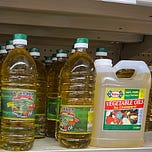


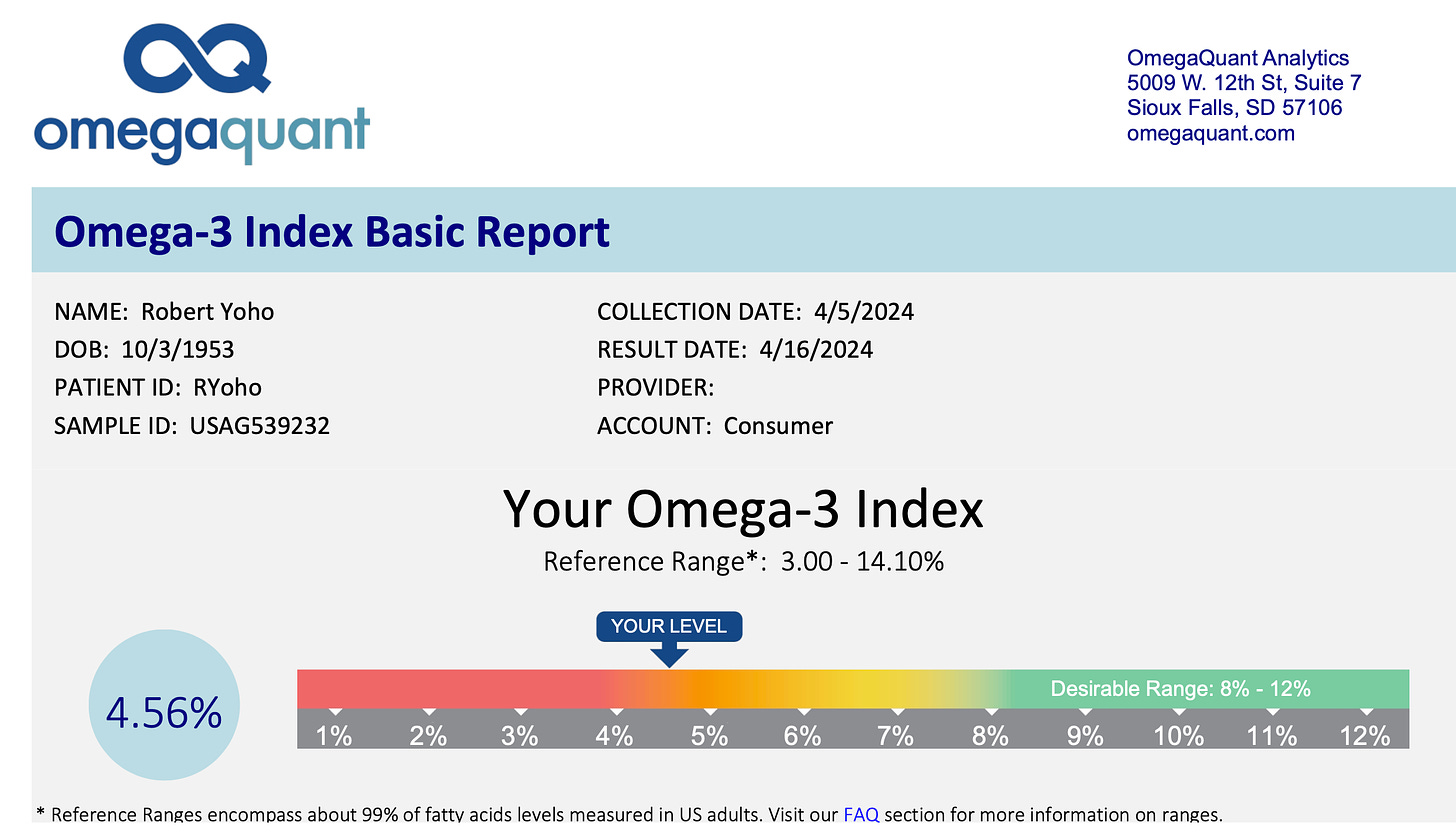
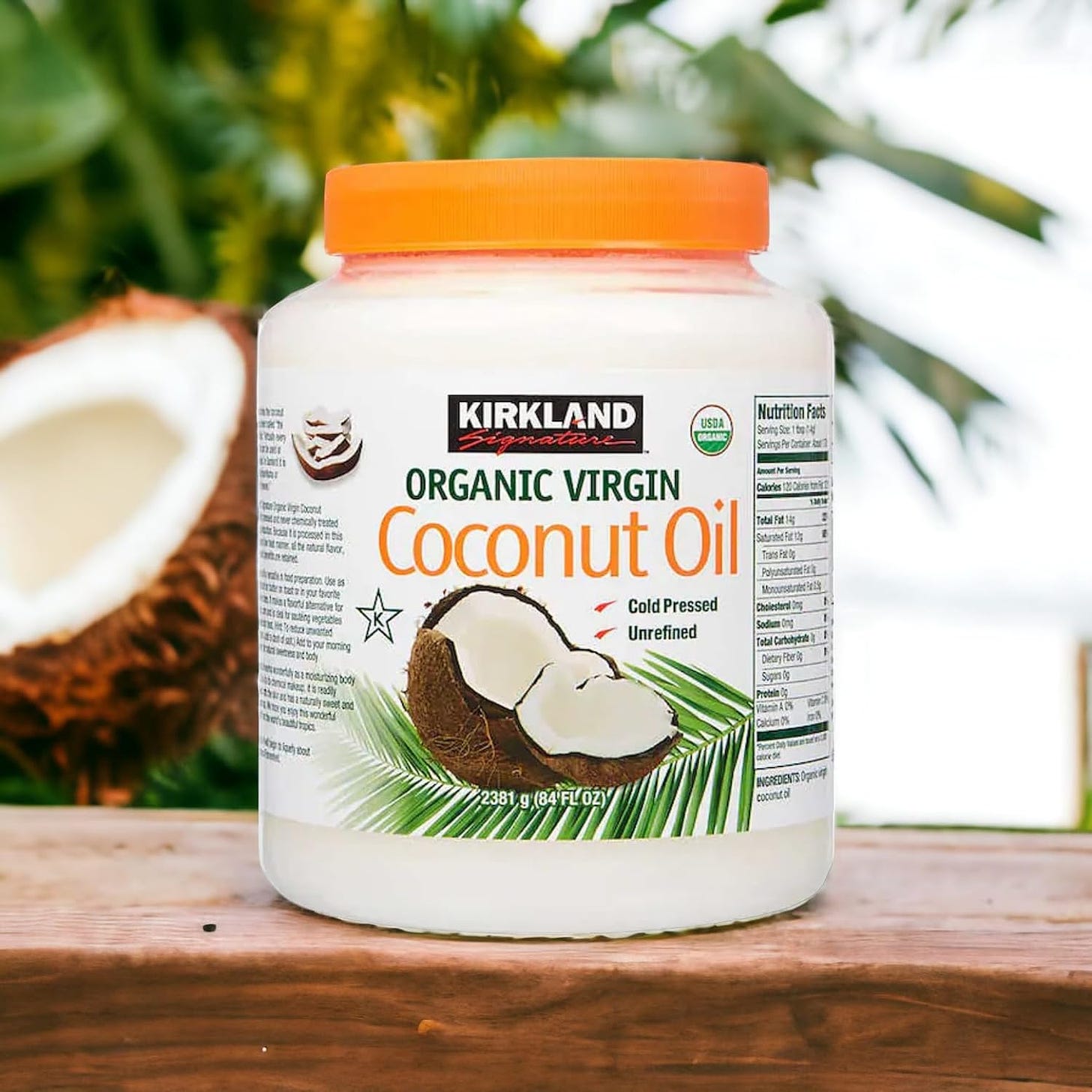
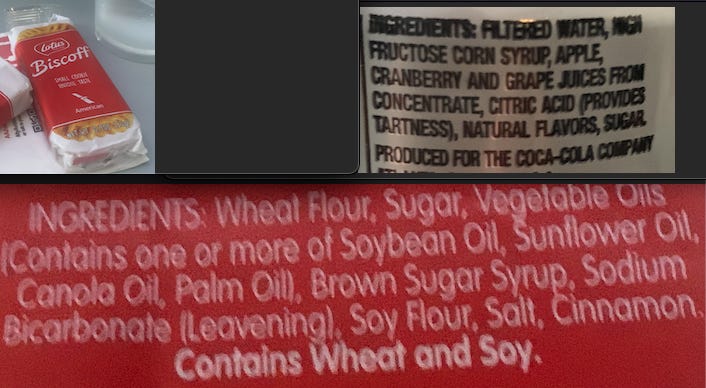


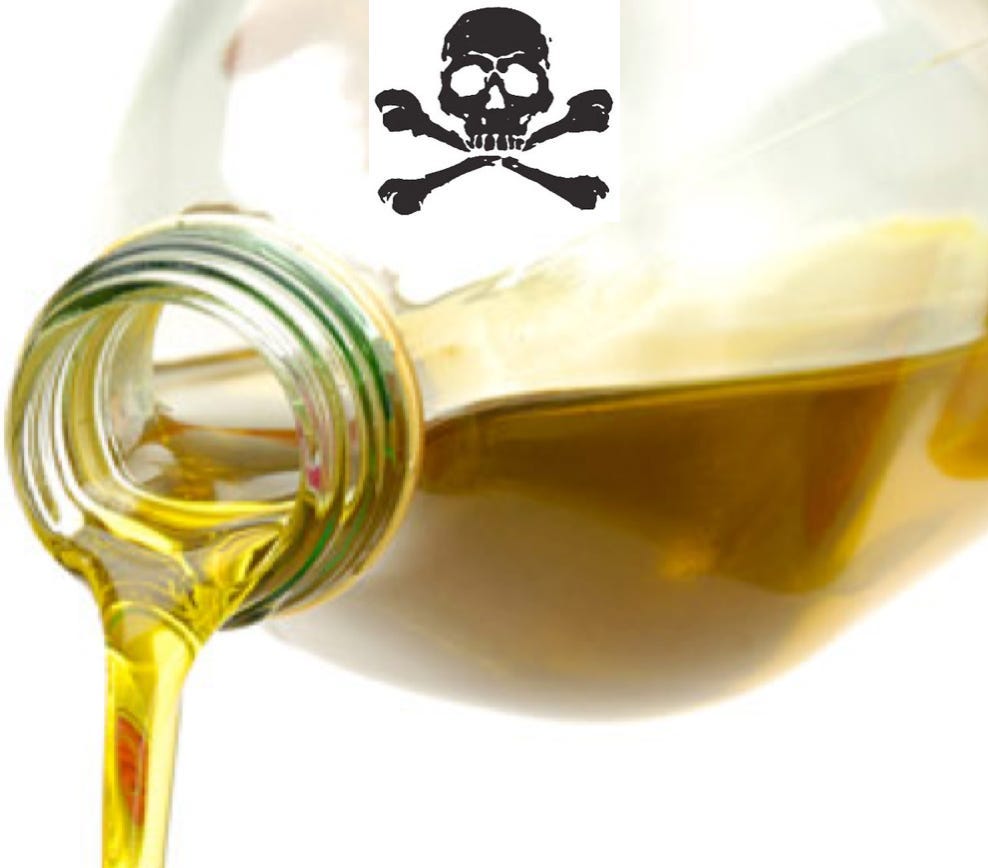
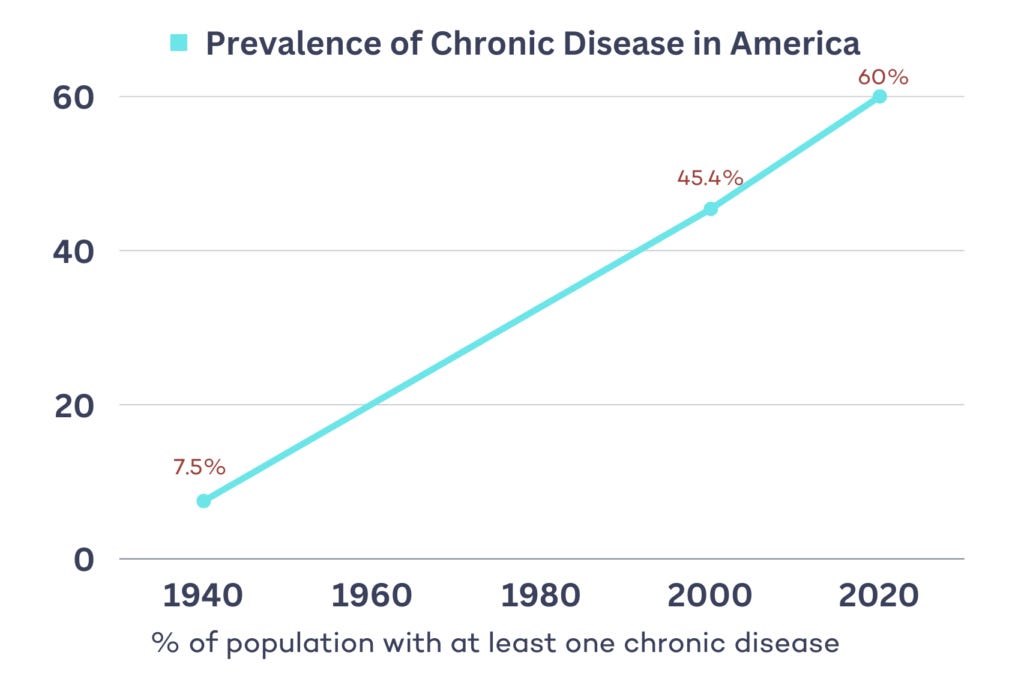
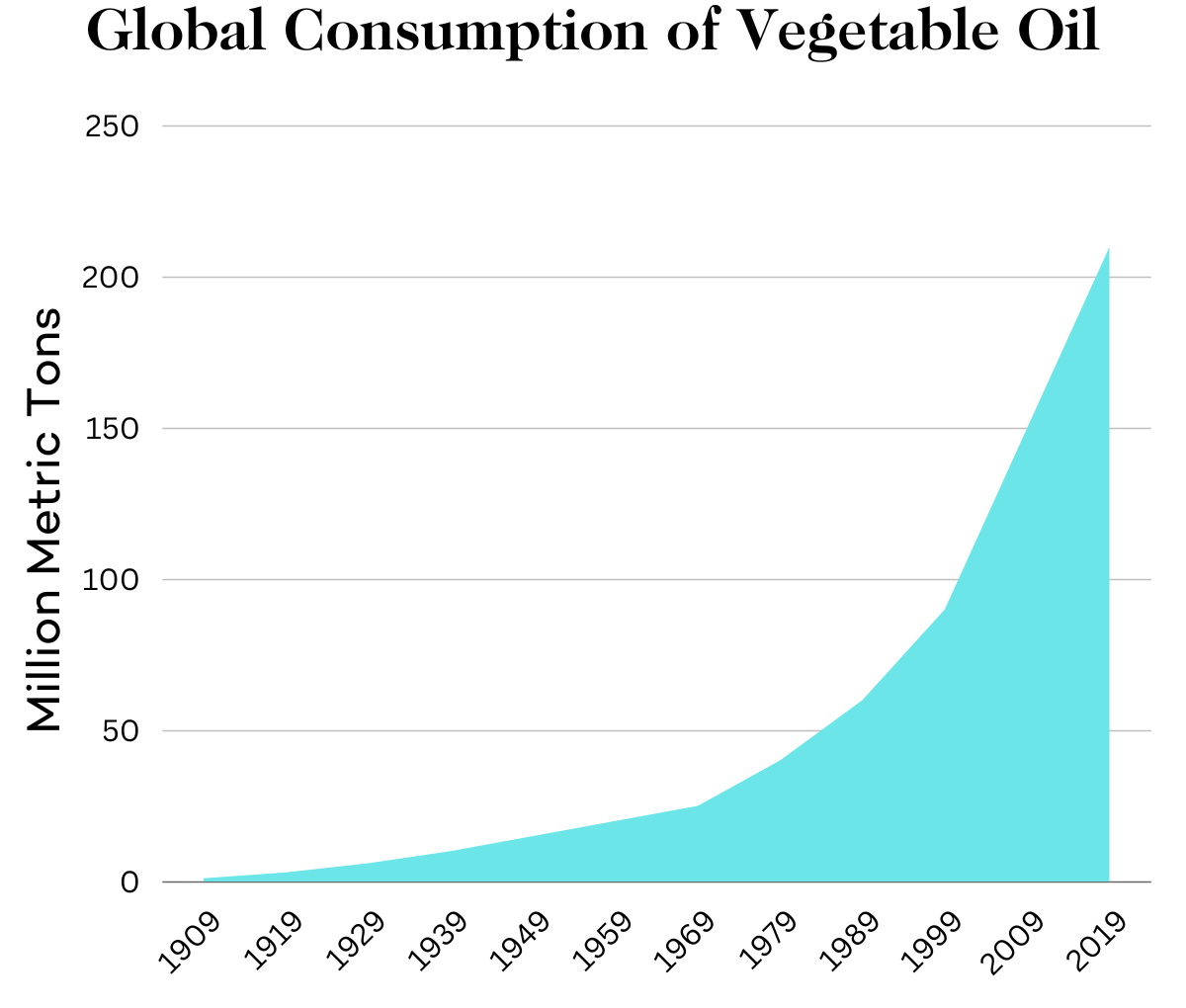
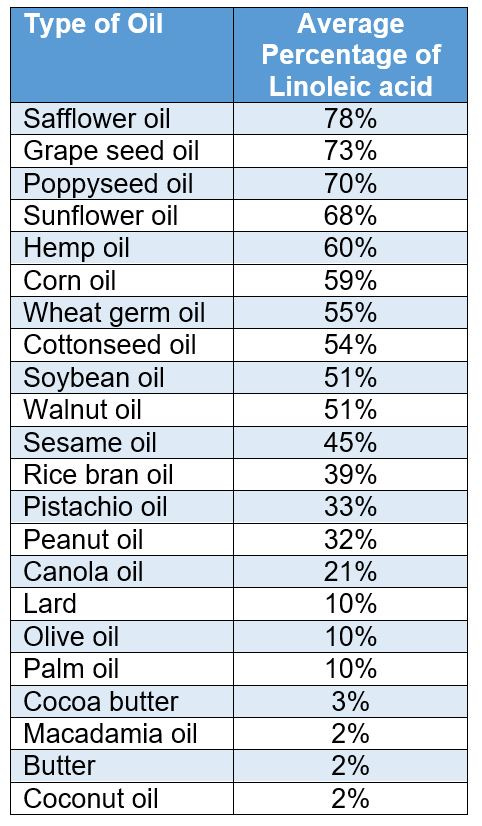
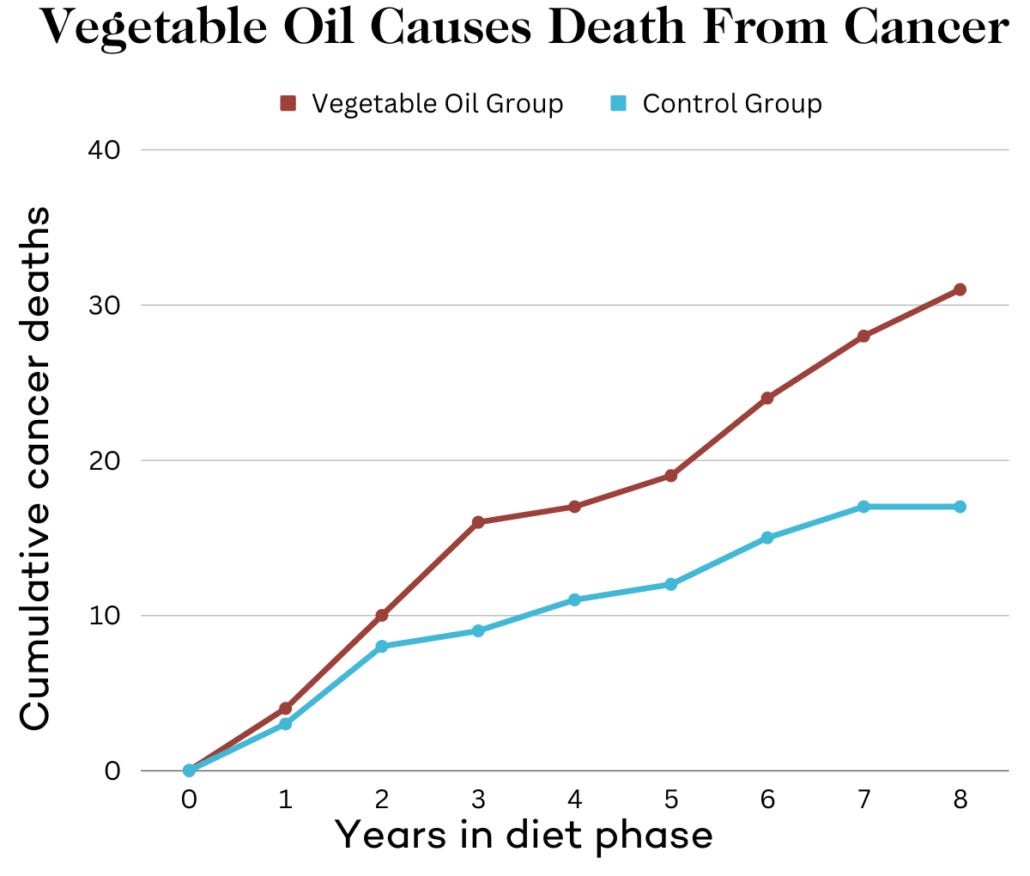
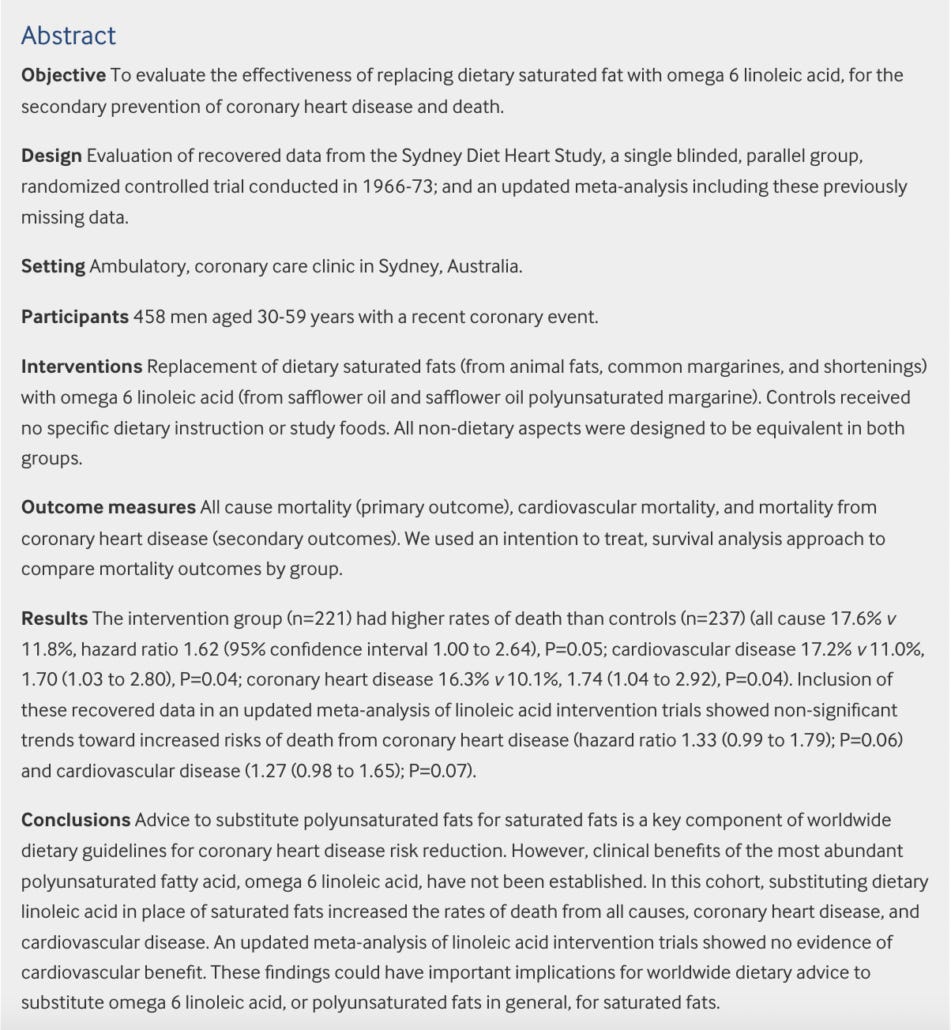

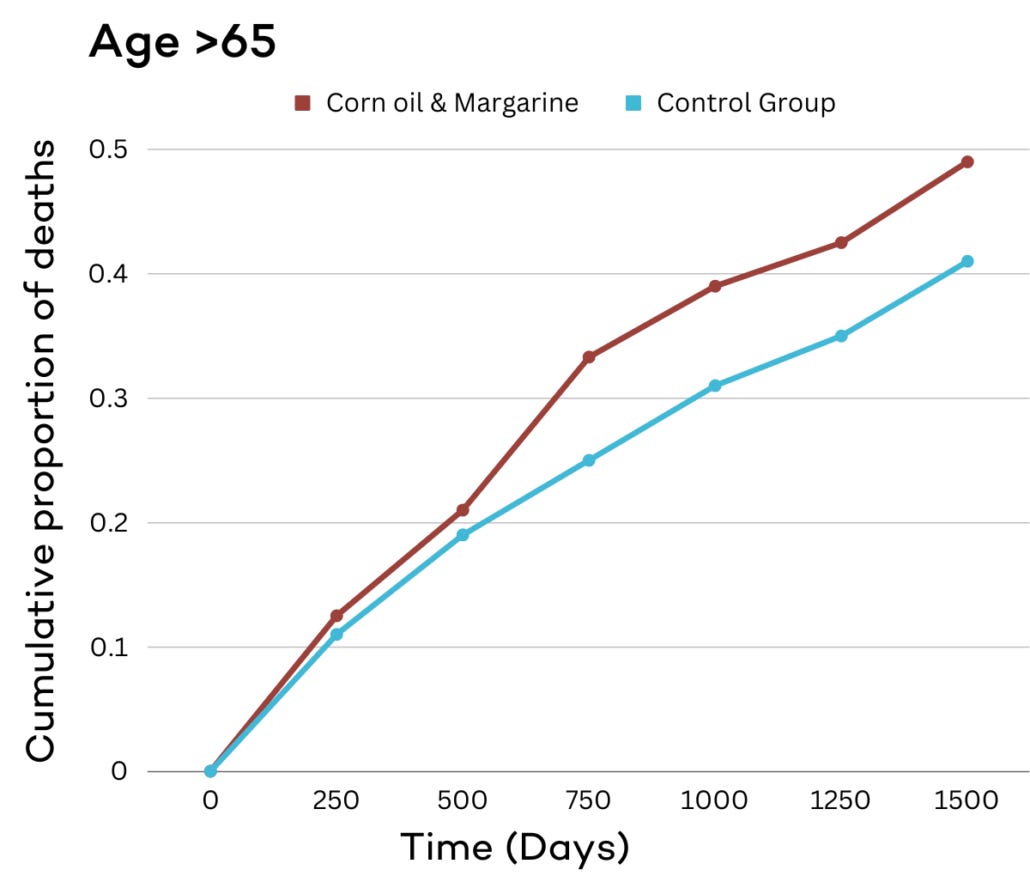
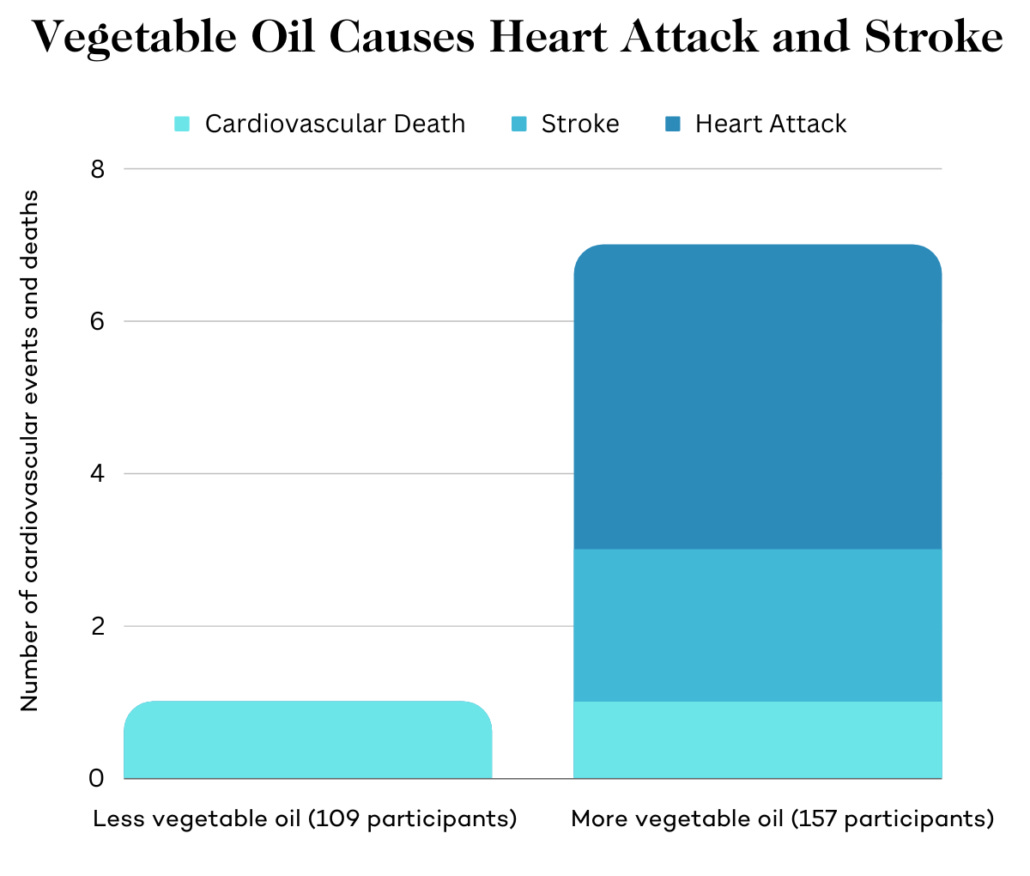
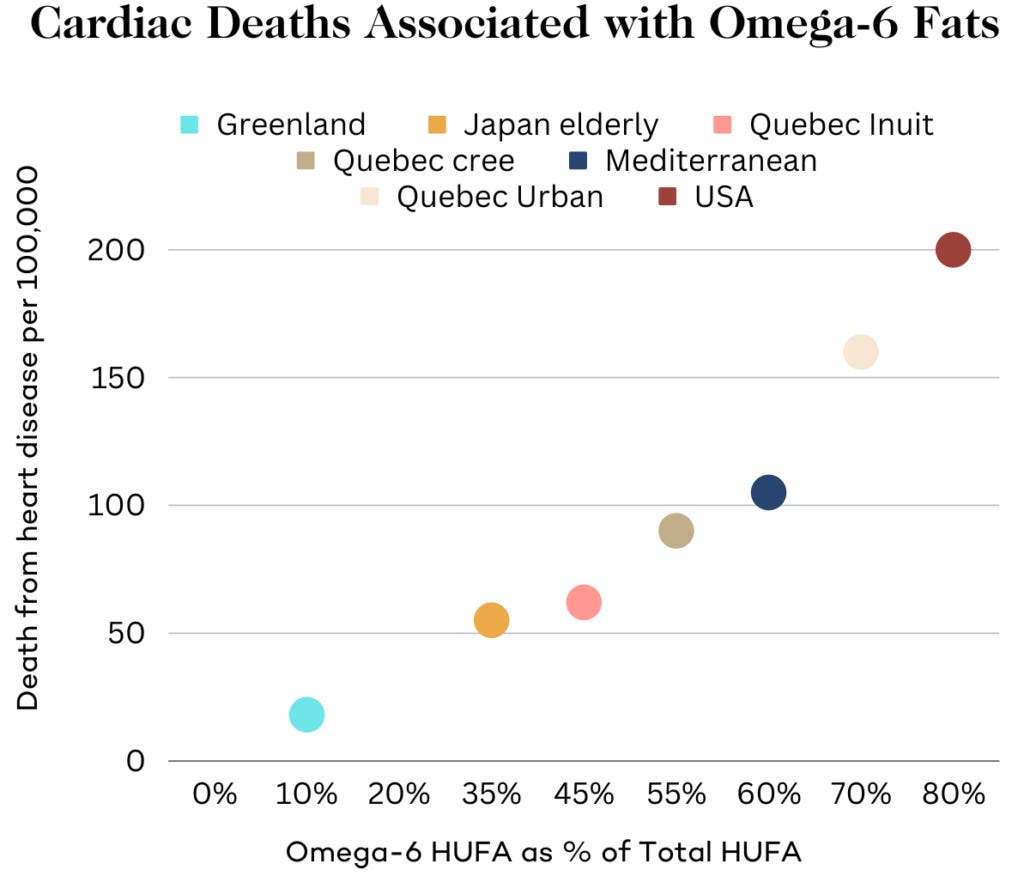
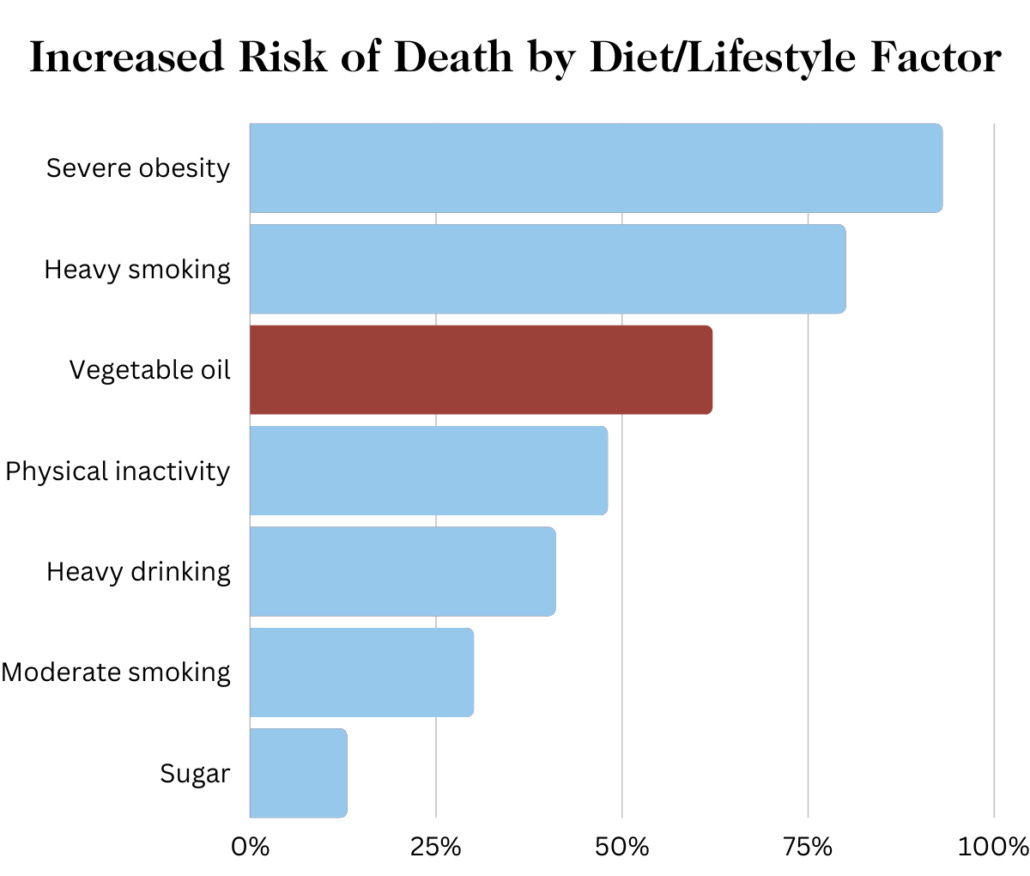



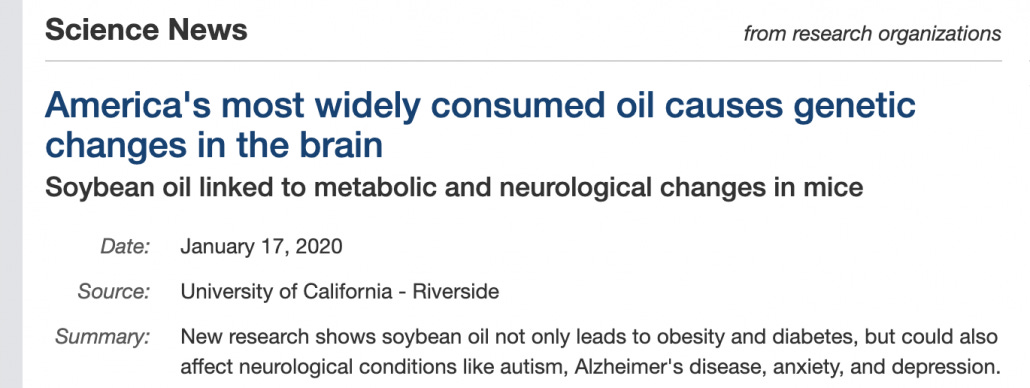
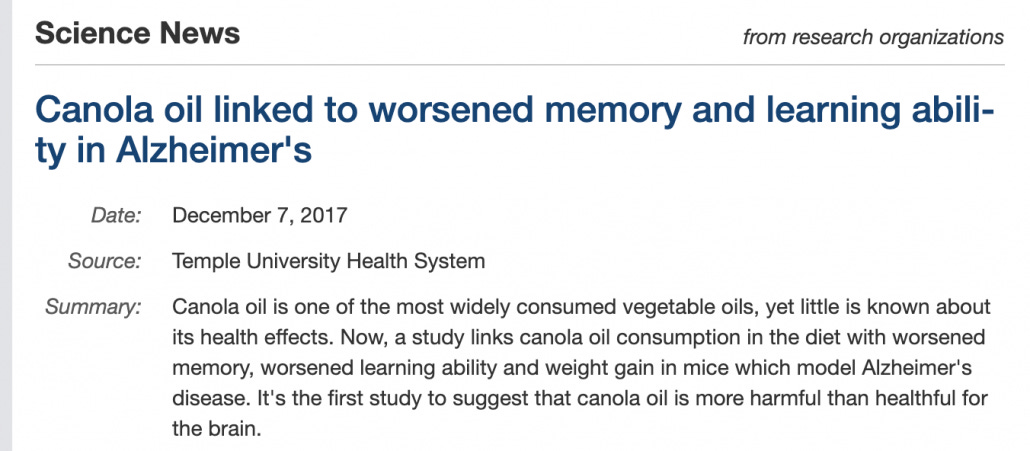
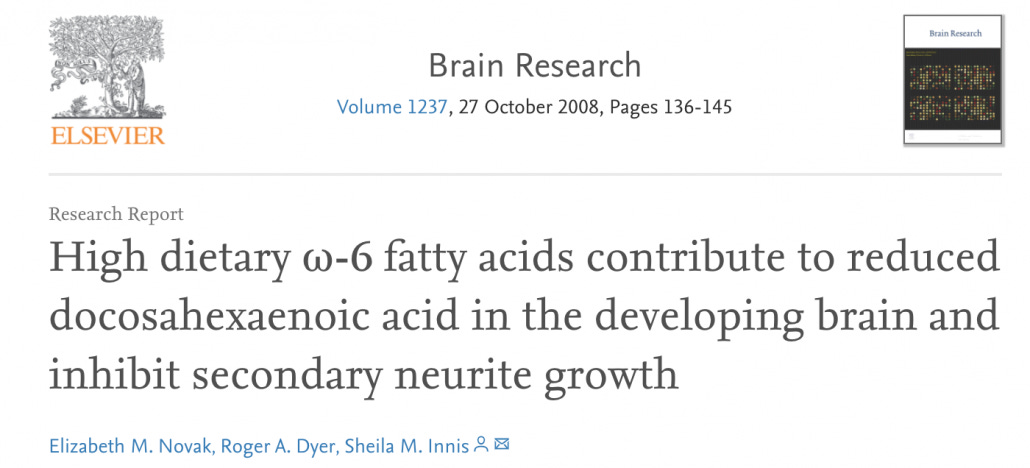
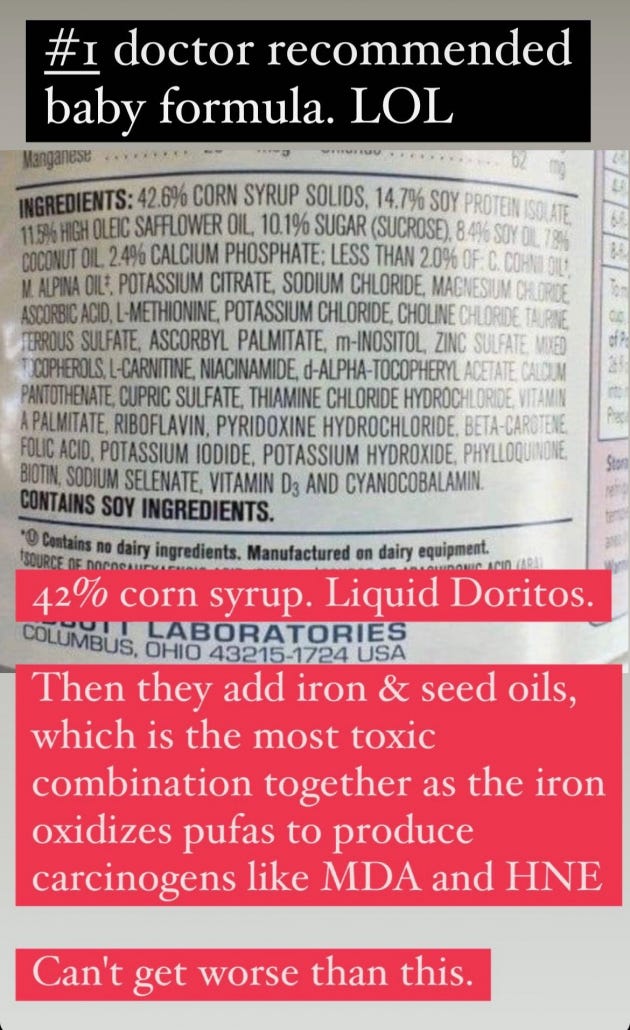
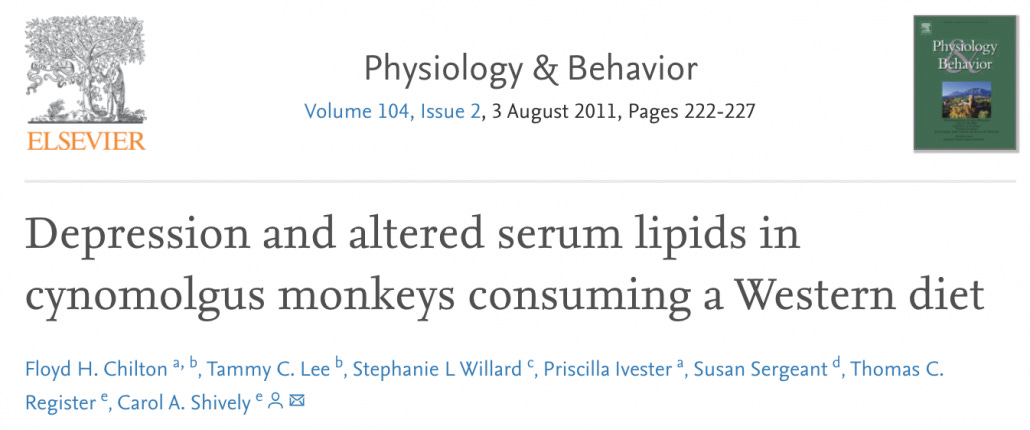

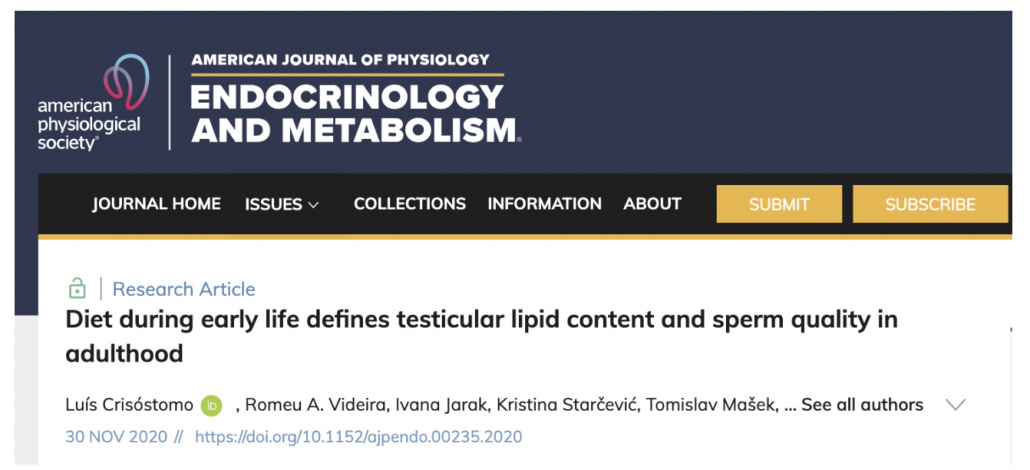
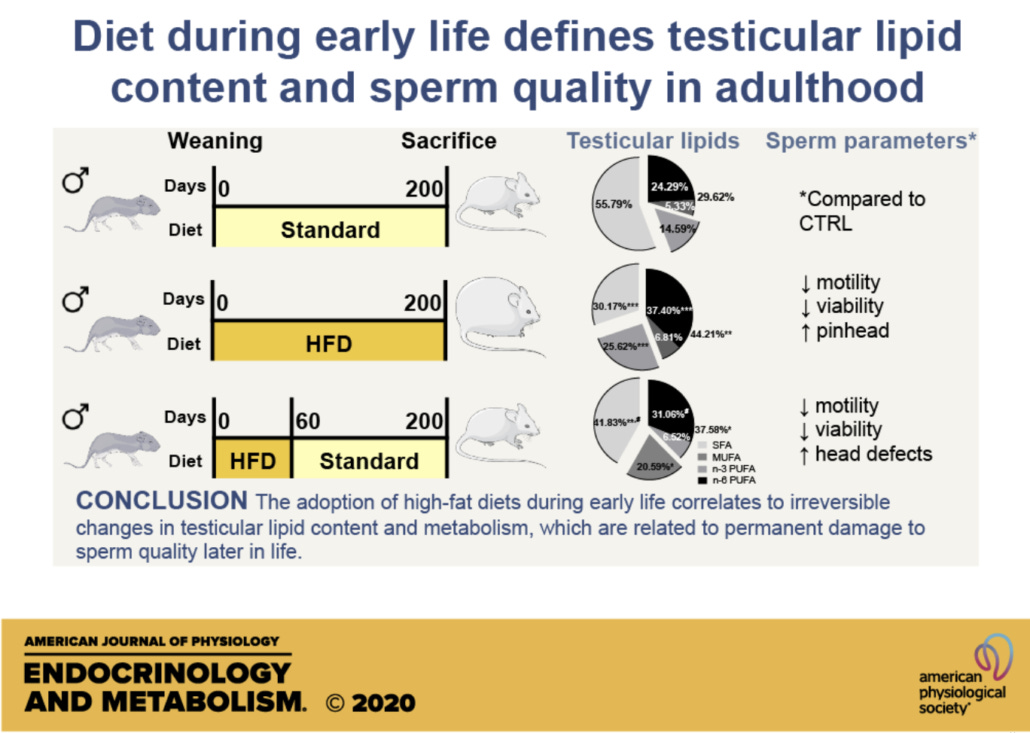

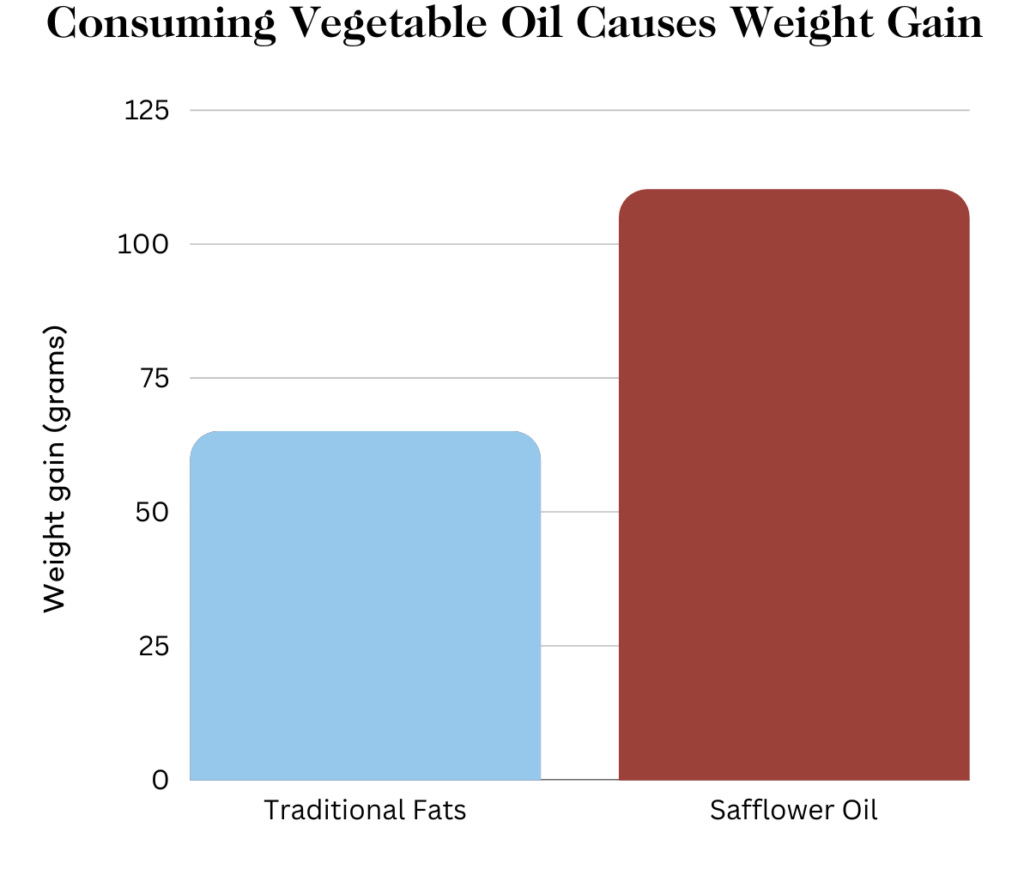

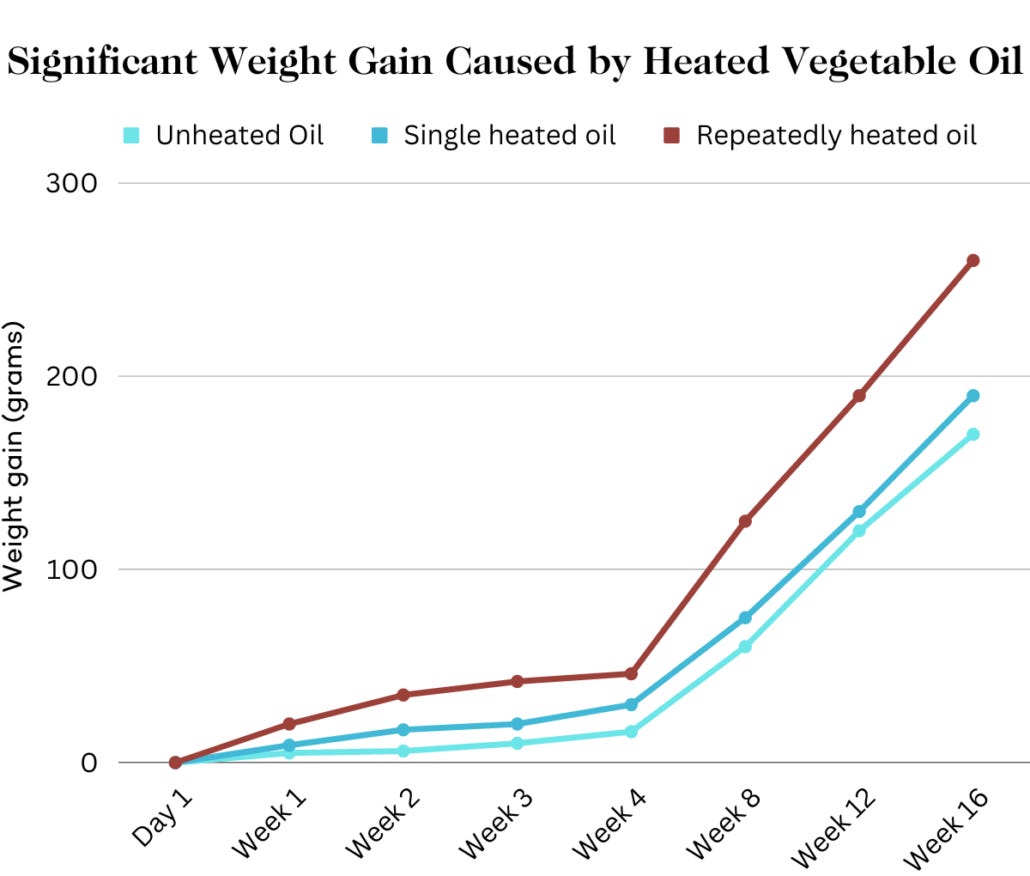



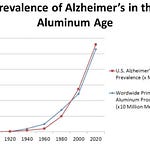





Share this post